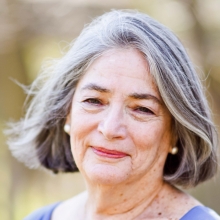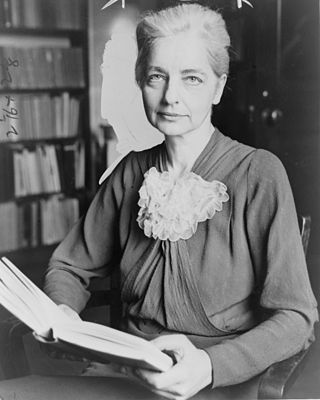
Ruth Fulton Benedict was an American anthropologist and folklorist.

Eric Richard Kandel is an Austrian-born American medical doctor who specialized in psychiatry, a neuroscientist and a professor of biochemistry and biophysics at the College of Physicians and Surgeons at Columbia University. He was a recipient of the 2000 Nobel Prize in Physiology or Medicine for his research on the physiological basis of memory storage in neurons. He shared the prize with Arvid Carlsson and Paul Greengard.

Romila Thapar is an Indian historian. Her principal area of study is ancient India, a field in which she is pre-eminent. Thapar is a Professor of Ancient History, Emerita, at the Jawaharlal Nehru University in New Delhi.

Daniel J. Kevles is an American historian of science best known for his books on American physics and eugenics and for a wide-ranging body of scholarship on science and technology in modern societies. He is Stanley Woodward Professor of History, Emeritus at Yale University and J. O. and Juliette Koepfli Professor of the Humanities, Emeritus at the California Institute of Technology.

Ruth Sager was an American geneticist. Sager enjoyed two scientific careers. Her first was in the 1950s and 1960s when she pioneered the field of cytoplasmic genetics by discovering transmission of genetic traits through chloroplast DNA, the first known example of genetics not involving the cell nucleus. The academic community did not acknowledge the significance of her contribution until after the second wave of feminism in the 1970s. Her second career began in the early 1970s and was in cancer genetics; she proposed and investigated the roles of tumor suppressor genes.
Dorothy Wolfers Nelkin was an American sociologist of science most noted for her work researching and chronicling interplay between science, technology and the general public. Her work often highlighted the ramifications of unchecked scientific advances and potential threats to privacy and civil liberties. She was the author or co-author of 26 books, including Selling Science: How the Press Covers Science and Technology, The Molecular Gaze: Art in the Genetic Age, and Body Bazaar: The Market for Human Tissue in the Biotechnology Age.
Mary Beth Norton is an American historian, specializing in American colonial history and well known for her work on women's history and the Salem witch trials. She is the Mary Donlon Alger Professor Emeritus of American History at the Department of History at Cornell University. Norton served as president of the American Historical Association in 2018. She is a recipient of the Ambassador Book Award in American Studies for In the Devil's Snare: The Salem Witchcraft Crisis of 1692. Norton received her Bachelor of Arts at the University of Michigan (1964). The next year she completed a Master of Arts, going on to receive her Ph.D. in 1969 at Harvard University. She identifies as a Democrat and she considers herself a Methodist. Mary Beth Norton is a pioneer of women historians not only in the United States but also in the whole world, as she was the first woman to get a job in the department of history at Cornell University.

Ruth Milkman is an American sociologist of labor and labor movements. She is Distinguished Professor of Sociology at the Graduate Center, CUNY and the director of research at CUNY School of Labor and Urban Studies. Between 1988 and 2009 Milkman taught at the University of California, Los Angeles, where she directed the UCLA Institute for Research on Labor and Employment.
Joan Sylvia Lyttle Birman is an American mathematician, specializing in low-dimensional topology. She has made contributions to the study of knots, 3-manifolds, mapping class groups of surfaces, geometric group theory, contact structures and dynamical systems. Birman is research professor emerita at Barnard College, Columbia University, where she has been since 1973.

Esther Marley Conwell was a pioneering American chemist and physicist, best known for the Conwell-Weisskopf theory that describes how electrons travel through semiconductors, a breakthrough that helped revolutionize modern computing. During her life, she was described as one of the most important women in science.

Esther Duflo Banerjee, FBA is a French–American economist who is a professor of Poverty Alleviation and Development Economics at the Massachusetts Institute of Technology (MIT). She is the co-founder and co-director of the Abdul Latif Jameel Poverty Action Lab (J-PAL), which was established in 2003. She shared the 2019 Nobel Memorial Prize in Economic Sciences with Abhijit Banerjee and Michael Kremer, "for their experimental approach to alleviating global poverty".
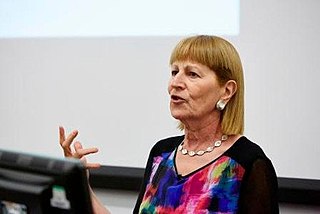
Judy Wajcman, is the Anthony Giddens Professor of Sociology at the London School of Economics and Political Science. She is the Principal Investigator of the Women in Data Science and AI project at The Alan Turing Institute. She is also a Visiting Professor at the Oxford Internet Institute. Her scholarly interests encompass the sociology of work, science and technology studies, gender theory, and organizational analysis. Her work has been translated into French, German, Greek, Italian, Korean, Japanese, Portuguese, Russian, Chinese and Spanish. Prior to joining the LSE in 2009, she was a Professor of Sociology in the Research School of Social Sciences at the Australian National University. She was the first woman to be appointed the Norman Laski Research Fellow (1978–80) at St. John's College, Cambridge. In 1997 she was elected Fellow of the Academy of the Social Sciences in Australia.
Lila Ruth Gleitman was an American professor of psychology and linguistics at the University of Pennsylvania. She was an internationally renowned expert on language acquisition and developmental psycholinguistics, focusing on children's learning of their first language.
Margaret W. Rossiter is an American historian of science, and Marie Underhill Noll Professor of the History of Science, at Cornell University. Rossiter coined the term Matilda effect for the systematic suppression of information about women in the history of science, and the denial of the contribution of women scientists in research, whose work is often attributed to their male colleagues.
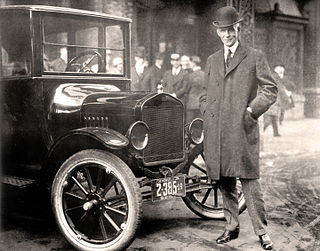
From 1919 to 1929, primarily North America and parts of Europe experienced the rise of the Roaring Twenties. Social and economic circumstances underwent dramatic changes. The economic power and high employment of the United States allowed Americans to spend more extravagantly on entertainment. War veterans returned home seeking relaxation and comfort instead of returning to their factory or agricultural duties. Watching movies and listening to the newly invented radio became increasingly popular during this period, which further encouraged the desires of people for Hollywood style lives of indulgence and ease. This extravagance was ignited by the introduction of Henry Ford's Model T, a car affectionately known as the "Tin Lizzie." Cars became a major source of freedom and adventure as well as travel, and cars greatly altered the standard of living, the social patterns of the day, and urban planning; and cars differentiated suburban and urban living purposes. In addition, the rise of cars led to the creation of new leisure activities and businesses. The car became the center of middle and working class life until the start of World War II.
Barbara Kirshenblatt-Gimblett is a scholar of Performance and Jewish Studies and a museum professional. Professor Emerita of Performance Studies at New York University, she is best known for her interdisciplinary contributions to Jewish studies and to the theory and history of museums, tourism, and heritage. She is currently Chief Curator of the Core Exhibition and Advisor to the Director at POLIN Museum of the History of Polish Jews in Warsaw.
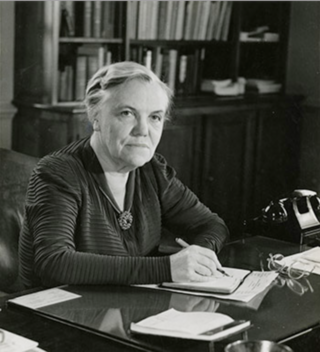
Katharine Blunt was an American chemist, professor, and nutritionist who specialized in the fields of home economics, food chemistry and nutrition. Most of her research was on nutrition, but she also made great improvements to research on calcium and phosphorus metabolism and on the basal metabolism of women and children. She served as the third president of Connecticut College.
Seymour I. Schwartz, was the Distinguished Alumni Professor for the Department of Surgery at the University of Rochester in Rochester, New York. He was one of the most prolific and honored surgeons in American history with further successes outside of the field of medicine as a renowned author and cartographic historian. His most notable accomplishments in surgery include being the founding editor-in-chief of Schwartz's Principles of Surgery, Chairman of the Department of Surgery at the University of Rochester (1987-1998), Editor-in-Chief of the Journal of the American College of Surgeons (1996-2004) and President of the American College of Surgeons (1997-1998). After spending nearly 65 years in the field of surgery, he has published hundreds of research articles, textbook chapters, and received numerous honors in the United States and abroad. Schwartz has lectured throughout the world as a visiting professor and donated to many philanthropic endeavors. His influence on surgical education and leadership has impacted nearly every practicing surgeon in the world. Throughout his career, Schwartz has treated and changed the lives of tens of thousands of patients and trained generations of residents and fellows to share in his legacy and do the same.
Sally Gregory Kohlstedt is an American historian of science. She is a professor in the Department of Earth Sciences and in the Program in History of Science and Technology at the University of Minnesota. Kohlstedt served as the president of the History of Science Society from 1992 to 1993. Her research interests focus on the history of science in American culture and the demographics of scientific practice in institutions such as museums and educational institutions, including gender participation.
